These days there are lots of reasons to use and enjoy non-dairy milk. So let’s check out the best non-dairy milks for coffee and other frothy, milky coffees.
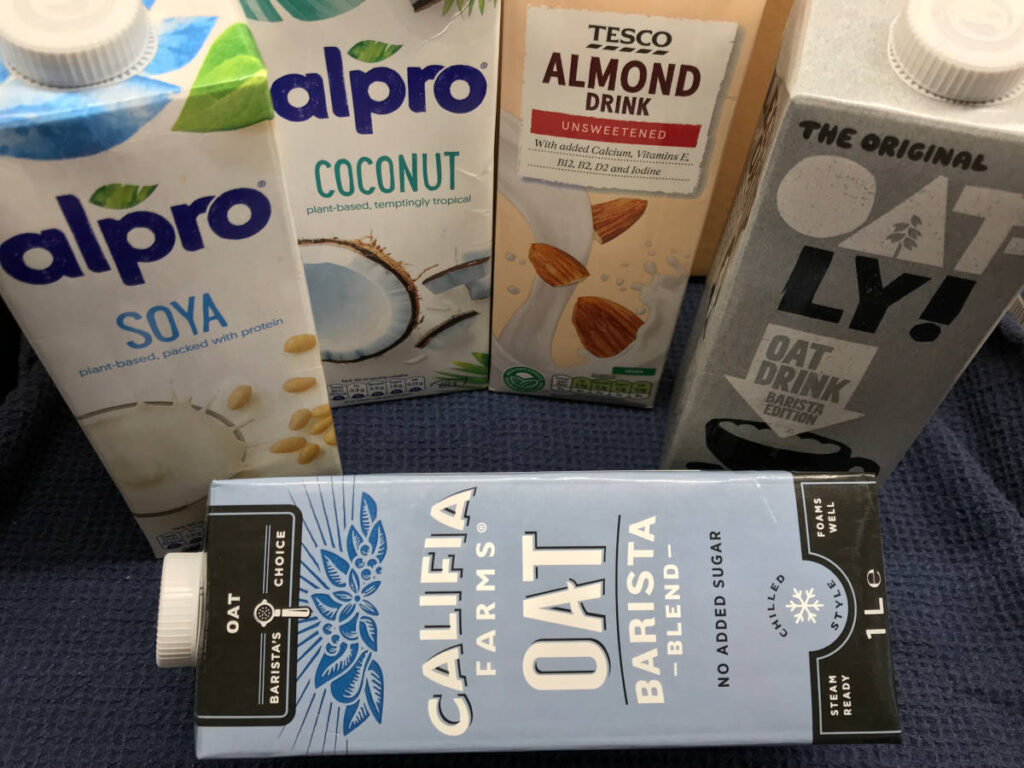
But don’t forget, if you want to know about the best dairy milks for coffee, check out my review.
Oat milk
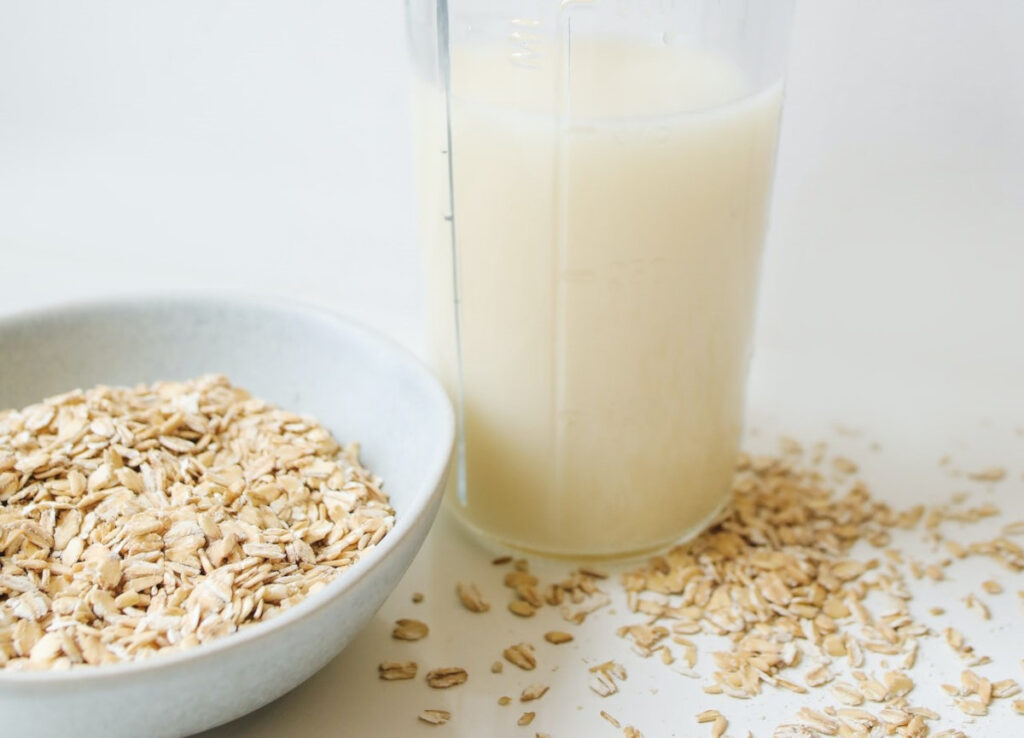
Oat milk is a plant-based milk alternative made by soaking oat groats in water. It’s a creamy, slightly sweet, and nutrient-rich non-dairy milk that’s become increasingly popular. I should know – its my current go to non-dairy milk.
An increasingly popular choice for all coffee drinkers, oatmilk has a creamy texture and a nutty flavor that goes well with espresso. It’s also high in fiber and protein, making it a healthy choice. Plus the high protein content makes it very easy to froth, giving you rich tasty and creamy coffee.
Oat milk is surely a contender for best non-dairy milks for coffee.
Check out my easy and delicious oat milk latte recipe. Or if you want even more ideas, check out my ultimate guide to 11 delicious oat milk coffees you can easily make at home.
Frothing oat milk
Pour oat milk into a microwave-safe jug and heat. Once it’s warm use a hand blender to foam the milk. Start with the blender straight down with the head fully submerged and blend for 1 minute. Then change the angle of the blender to 45 degrees, keeping the head fully submerged blend until you get your perfect foam.
Pros of Oat milk
- It’s dairy-free and vegan-friendly.
- It has a creamy texture that easily froths to make perfect frothy coffees.
- It has a nutty flavor that pairs well with and holds its own against even very strong espresso.
- It’s healthy, being high in fiber and protein and vitamins.
Be aware of
- Oat milk is more expensive than cow’s milk.
- Poor quality oat milk can taste watery or bland.
- Some people may be allergic to oats.
Soy milk
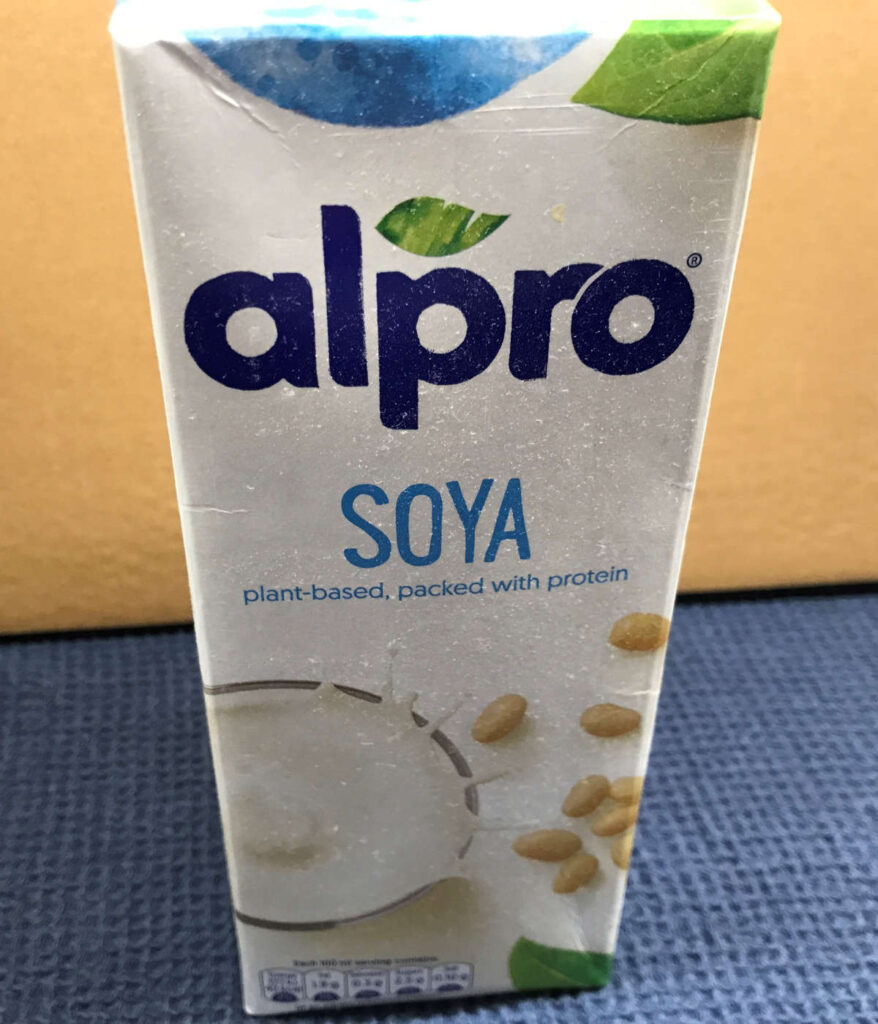
Soy milk is a good choice if you are lactose intolerant or have dairy allergies because it doesn’t contain any lactose or dairy proteins. It also has a slightly nutty flavor that goes well with coffee.
Make sure you buy good quality soy milk. Cheaper blends can be watery and flavorless. Some even have an unpleasant chalky residue.
Pros of soy milk :
- It’s low in calories and fat.
- Soy milk is easier to digest than dairy milk.
- You may find soy milk coffees more flavorful than dairy milk versions.
- Soy milk uniquely contains phytoestrogens which some people believe can have health benefits.
Be aware of
- Soy milk is somewhat lacking in flavor, resulting in your coffee being dominated by the coffee
- There are reports of soy milk causing allergic reactions such as itching, rashes and even breathing problems. While others complain of constipation, bloating, and nausea.
- Soy milk can be difficult to find in some areas.
Almond milk
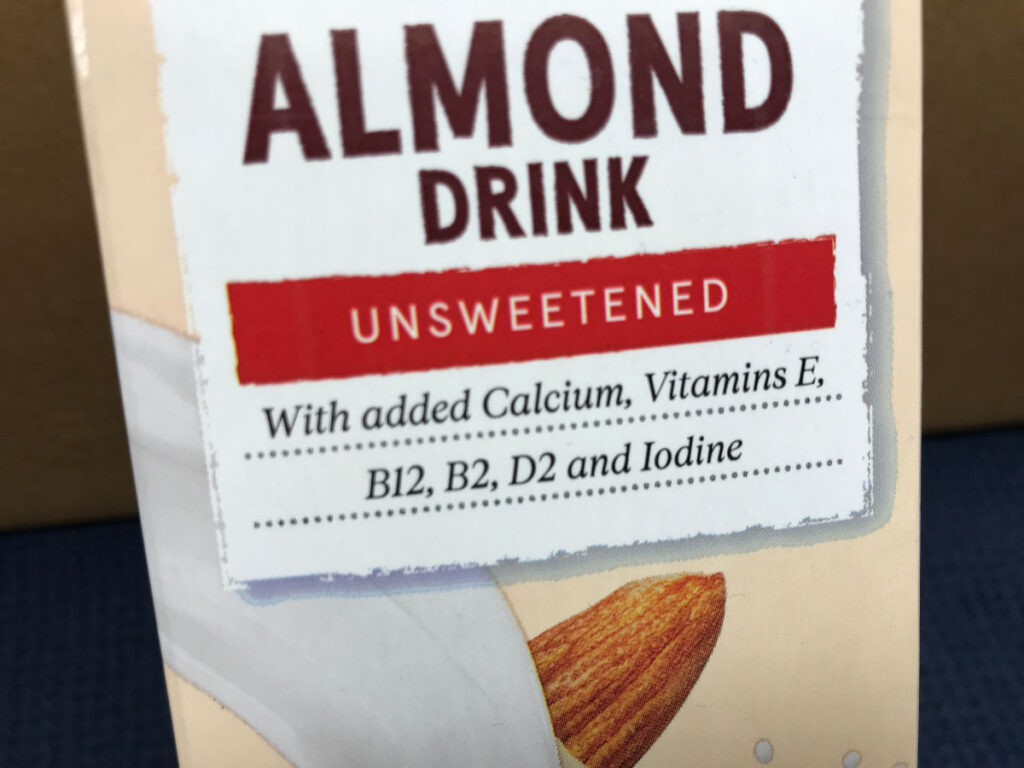
Almond milk is another good choice for people who don’t drink cow’s milk or soy milk. It has a light almond flavor and a slightly thick texture that makes it good for creamy lattes and cappuccinos.
It has a lightly nutty taste and is high in protein and healthy fats, making it a popular choice for those who are lactose intolerant or looking for a healthier milk alternative. Almond milk is also low in calories.
Making almond milk coffee at home
Making a coffee with almond milk is just as easy as making any milky coffee. Brew a shot (or two) of espresso. While the coffee is brewing, warm the almond milk in a microwave. Once warmed use a hand blender to froth the milk. Almond milk is high in protein so will froth, though not as well as oat milk.
Pour the espresso into a latte glass or mug and add the almond milk, keeping back the foam to layer on top.
Making almond milk at home
It’s made by soaking almonds in water overnight. Then drain the water and replace with fresh water, some salt and any flavoring you want to add. Grind the almonds as fine as possible, then strain the ground almonds through a fine cloth. The resulting almond milk will be every bit as good as store-bought – because you made it yourself!
Pros of Almond milk
- Almond milk is dairy-free, making it ideal for those who are lactose intolerant.
- It has a nutty flavor that enhances the taste of your coffee.
- It’s low in calories, making it a good choice for those watching their weight.
- Almond milk is a good source of antioxidants and may help to protect against some chronic diseases.
- Some studies have shown that it might help to lower cholesterol levels.
Be aware of
- Often promoted as healthier than cow’s milk, but it contains less protein and calcium than cow’s milk.
- People with nut allergies may be allergic to almond milk.
- High processing costs and a short shelf life make it an expensive option compared to other plant-based milks.
Coconut milk
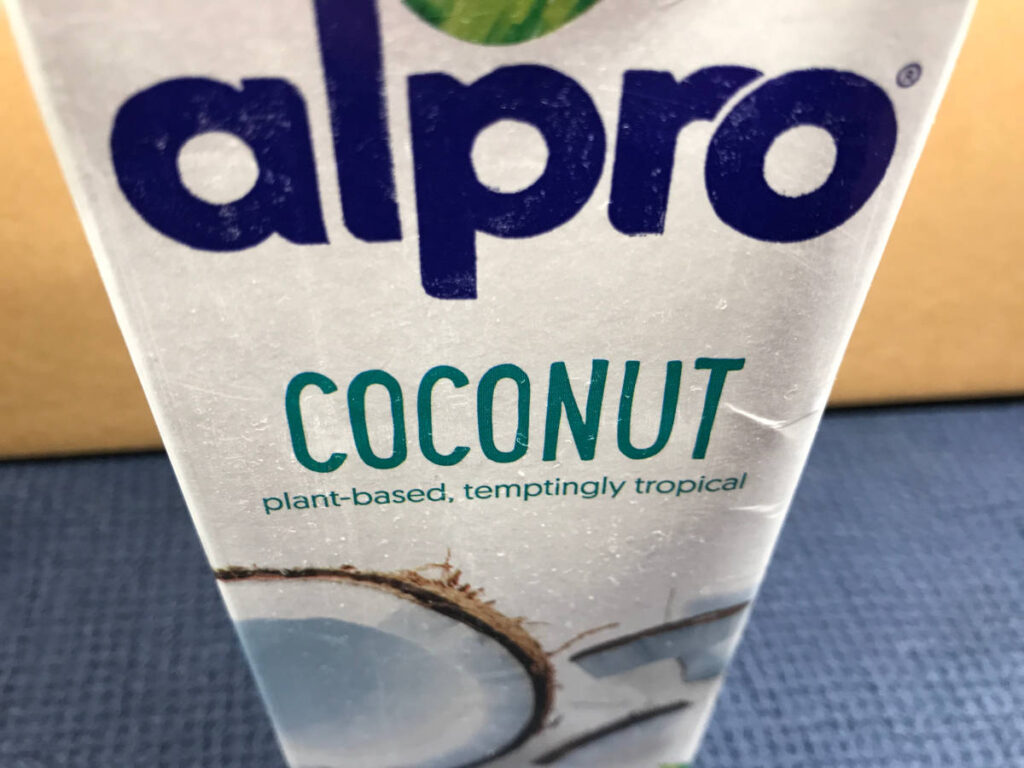
With a delicious fresh taste, coconut milk is becoming increasingly popular as an alternative to cow’s milk and other plant-based milks. It’s rich in healthy fats, making it a great choice when you are looking for a dairy milk alternative. Coconut milk is also high in calcium and vitamin D, which are important for protecting bone health.
When coconut milk first appeared on the market, there were a lot of very low-quality products on sale. Happily, times have changed, but you still need to stick to better-quality products.
Foaming coconut milk
Yes, you can froth coconut milk, plus its creamy. Both of which make it a strong contender for best non-dairy milk for cappuccinos and lattes in this line up.
It’s exactly the same technique as other types of milk. If you have a steam wand, put the wand in near the bottom of the jug for 20 seconds. Then change the angle to 45 degrees and raise it up so it’s near the surface of the milk. You are aiming to create a swirling motion. Keep going until micro-foam bubbles cover the surface and the side of the jug is too hot to hold.
Remove the jug and hold by the handle. Tap the jug on a firm surface to break down the uneven bubble structure, then pour.
Pros of coconut milk
- It contains protein, fiber, iron, calcium and magnesium as well as other essential nutrients such as potassium, zinc and Vitamin C.
- Coconut milk can help soothe digestive issues like irritable bowel syndrome (IBS), Crohn’s disease or ulcerative colitis.
- Studies have shown coconut milk consumption reduces blood pressure in just 8 weeks.
- The saturated fats found in coconut oil aid in the prevention of heart diseases.
- In addition to providing moisture retention benefits to skin cells; coconut milk helps protect your skin against sun damage.
Be aware of
- Coconut milk has a strong coconut flavor which can overpower the espresso.
- It can curdle to curdle when mixed with highly acidic coffee.
- With higher calories than other plant-based milks, coconut milk is not the best choice when trying to lose weight.
- Coconut milk is often expensive compared to other non-dairy alternatives.
Hazelnut milk
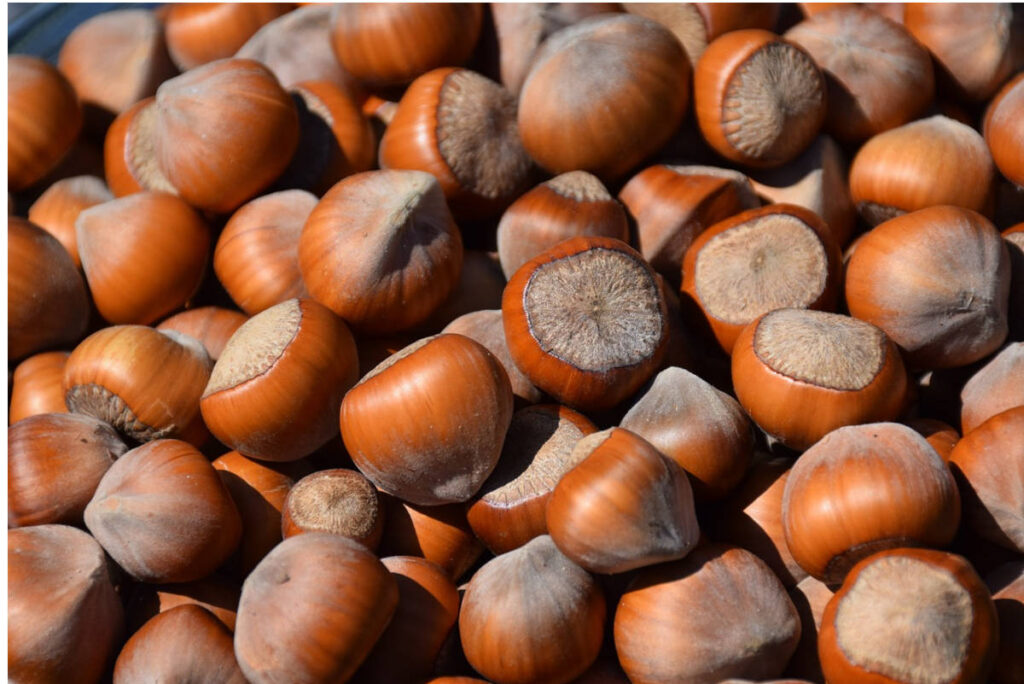
Hazelnut milk is a creamy, nutty alternative to traditional cow’s milk. It has a subtle sweetness that can be used in various recipes, and can easily be added to coffee or tea to add a delicious and nutritious boost. Hazelnut milk is rich in essential vitamins and minerals like copper, magnesium, potassium, Vitamin E and folate.
It is an excellent source of plant-based protein, providing 8 grams of protein per cup. Plus, it has a low glycemic index which helps to regulate blood sugar levels. It also helps maintain a healthy heart whilst boosting your energy levels.
Pros of hazelnut milk
- It has a sweet and nutty flavor that you’ll love.
- It is a great source of healthy fats, protein, and fiber, which helps to keep you fuller for longer periods of time.
- The natural sweetness in hazelnut milk makes it a great addition to milky coffees like lattes or cappuccinos as well as smoothies.
- Hazelnut milk contains up to 5 times the calories of cashew milk so it helps if you struggle to gain weight.
Be aware of
- Hazelnut milk contains more calories than many other plant-based milks, making it a poor choice when you are trying to lose weight.
- If you have a nut allergy, you should avoid hazelnut milk, unless you are certain hazelnuts are safe for you.
- Hazelnut milk can be more expensive than other types of non-dairy milk on the market.
Cashew milk
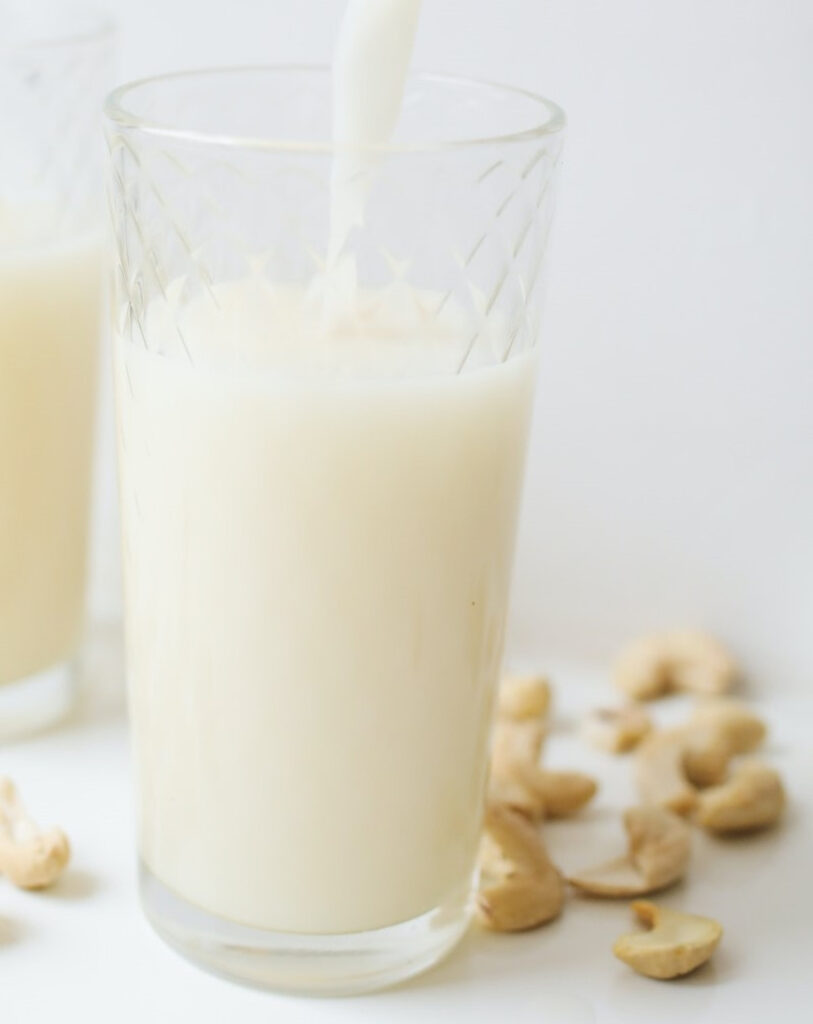
It’s made by blending cashews with water. It is a popular non-dairy milk alternative because it is creamy with a nutty flavor. Cashew milk is lower in fat and calories than coconut and almond milks, making it a good choice if you are watching your weight.
Despite being low in carbohydrates, cashew milk has a high fat and protein content. That makes it a good choice for lattes or other coffees.
Pros of cashew milk
- It’s high in protein and healthy fats, more protein per cup than cow’s milk, almond milk and oat milk.
- Cashews contain high amounts of antioxidants, which help fight chronic diseases like cancer and diabetes.
- Lactose-free and vegan-friendly, cashew milk is perfect for those with dairy allergies and intolerances as well as vegans.
- Cashew nut milk has a thicker consistency than some other types of non-dairy milks. So it’s great for coffees and milkshakes.
Be aware of
- Cashew milk can have a short shelf life compared to cow’s milk
- It’s not suitable for those with cashew nut allergies.
- Organic cashew milk is expensive.
Rice milk
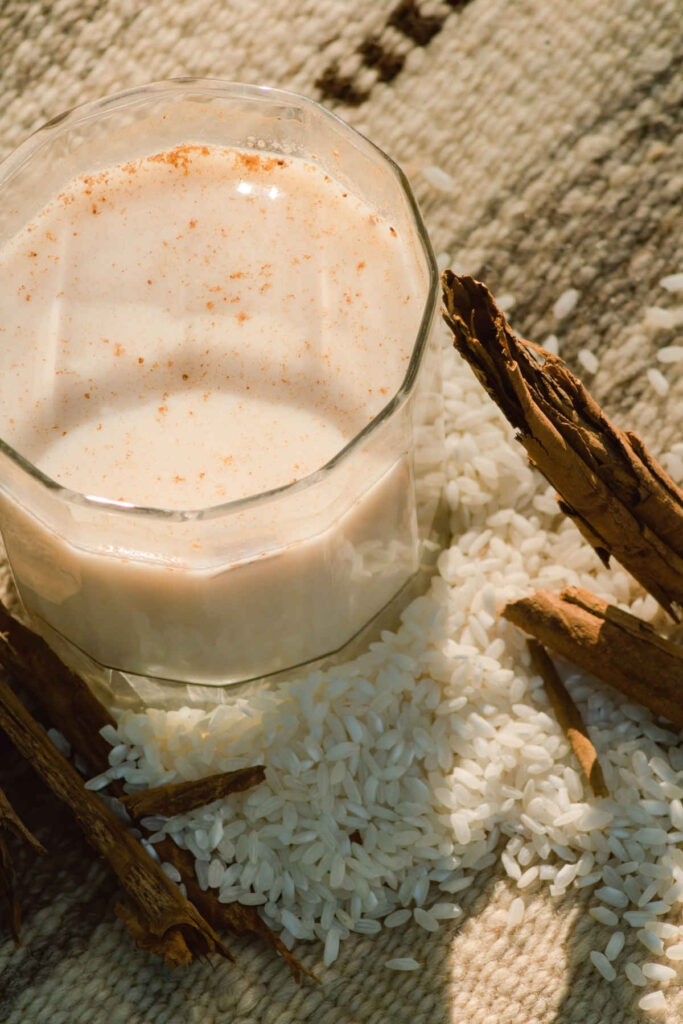
Rice milk is a vegan milk alternative. It has a high fat but very low protein content, making it a poor choice for lattes. It’s also high in carbohydrates, so it’s not a great choice for people who are on a keto diet.
Rice milk can be made at home by soaking raw rice in water. The mixture should be carefully strained to remove the original water. Then add fresh water, some salt and a sweetener. Blend to a pulp and strain the milk, before discarding the used rice.
Pros of rice milk
- Rice milk is naturally dairy-free, making it a good alternative for those with allergies to cow’s milk and other dairy products.
- It contains more calories than most other non-dairy milks, making it a good choice when you need an energy boost.
- Rice milk is rich in vitamin B12 and iron, both essential for good health.
Be aware of
- Many brands of store-bought rice milk contain added sugars which increase carbohydrate content significantly.
- It can be difficult to find organic versions in stores.
- Due to its low protein content, rice milk is not suitable for making lattes and other frothy coffees.
The bottom line
Although there are lots of contenders, the overall winner of best non-dairy milks for coffee is:
Top choice: has to be Oat milk. It’s rich and creamy and makes exceptionally good lattes.
Second place: Coconut milk. Again rich and creamy, if you can live with its distinctive taste.
Avoid: Rice milk. It simply does not make good frothy coffees.
Hi, I’m Eric Loftuss, co-founder of Bean Thirst with my wife Sophie.
My Coffee journey started young. I used to help my mom with the weekly shopping trip and we always called in to a coffee wholesaler and retail outlet in our town.
I really started to learn about coffee when, while in college, I worked in a local coffee shop and trained as a barista. Even though I went on to qualify and work as a lawyer, I still get a kick out of brewing a cup of Joe.
Sophie and I are so glad to be part of your coffee journey. Find out more about us
